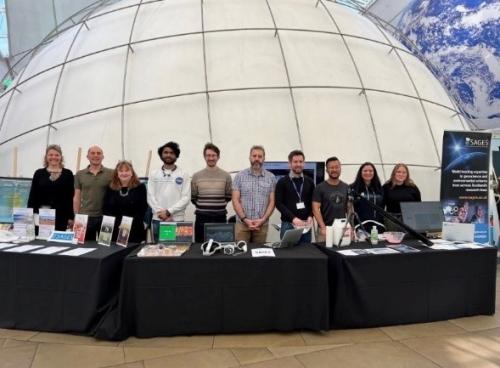
Over 600 school children aged 11 to 18 years old from 9 council areas in Scotland attended the ‘Your Plant-Your Future’ event at Our Dynamic Earth, Edinburgh on 5th March 2024. The aim of the event was to engage young people, raise awareness of the many environmental issues facing Scotland today, and inspire them to consider a future in a STEM related career- in an attempt to address the skills gap that currently exists. Pupils explored the amazing opportunities that can be unlocked through STEM pathways at school and beyond.
In this blog, hear more about the event which bought together >20 partners across research, industry, further and higher education to showcase exhibits and inspire the next generation of scientists through enthusiastic discussion and interactive displays.
Sowing Seeds for the Next generation Careers for People and the Environment
The James Hutton Institute was represented by the Hydro Nation International Centre, the Centre of Expertise for Waters and us (HNIC/CREW/SEFARI Gateway) under the Scottish Alliance for Geoscience Environment and Society (SAGES) umbrella and we highlighted the importance of water as a limited resource through a exhibits and a quiz.
Posters were displayed, on the hydrological cycle and how different sectors such as agriculture, industry and society impact on water quantity and quality. There was a particular emphasis on the changing demand on water as a consequence of climate change.
Image: Four Water Posters. Find out more at: Water Words | SEFARI
The day was a great success with over 100 pupils engaging with the stall, some were attracted by the quiz prizes(!) but a surprisingly large number of pupils were genuinely interested and keen to simply engage.
Images: Photographs of the stand and pupils interacting with exhibits.
We also used the opportunity to gather information on pupils’ perception of the availability of fresh water and its use from a domestic to global scale to stimulate discussion about how best to use our limited water resource.
Whilst pupils had a good understanding of how much of the earth’s surface is covered in water (70%), they were shocked to learn that only 5% of water is fresh. The pupils were also surprised that on average, each individual in Scotland uses around 180 litres of water per day, compared to an average of 144 litres per day for England and Wales. When asked what percentage of their daily water consumption comes from the use of the bathroom or toilet, the average response (61%) was close to the value presented in a recent study (63%). Most pupils grossly underestimated how much water is used during a 5-minute shower (the reality being 45 litres!). Following the quiz, many pupils were genuinely eager to learn how to change their behaviour and be more responsible water citizens.
Given that universities and colleges are struggling to attract students to environmental subjects such as geography and environmental science, we hope to have inspired at least a few to consider career possibilities in STEM disciplines. After completing the questionnaire one S5 student said: “Aw this is interesting; if everyone does their bit, we could save a lot of water. A career in this area could be a game changer and really make a difference.”
Rachel Helliwell and Lorna Dawson.